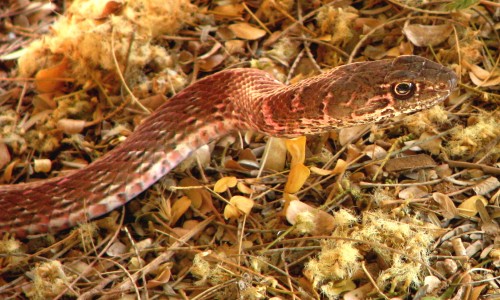Yard list: Coachwhip
It is a long thin snake.
 Working this morning in the backyard, E heard the scolding of cactus wrens, thrashers and other regulars of our deserty neighborhood. He tracked down the source: a sleek and mottled coachwhip marauding, trying to take advantage of the monsoon “bloom” of young animals. Coachwhips (Masticophis or Coluber flagellum) are swift and tireless daytime foragers, searching the ground for favored foods such as lizards, and easily climbing our shrubby, tangled palo verdes looking for eggs and nestlings.
Working this morning in the backyard, E heard the scolding of cactus wrens, thrashers and other regulars of our deserty neighborhood. He tracked down the source: a sleek and mottled coachwhip marauding, trying to take advantage of the monsoon “bloom” of young animals. Coachwhips (Masticophis or Coluber flagellum) are swift and tireless daytime foragers, searching the ground for favored foods such as lizards, and easily climbing our shrubby, tangled palo verdes looking for eggs and nestlings.
They are patterned cryptically, and look like the long braided látigo used by Mexican stockmen. (We called these whips “bullwhips” as kids — favored souvenirs of weekends in Ensenada, primarily used to harass each other.)
The coachwhip’s pattern is surprisingly cryptic, because like the Gila monster, it’s pink and brown, yet it still manages to disappear effectively against pebbly desert soils, and is nearly invisible even slung in the green branchlets of a palo verde, where it looks just like a rosy-brown dead branch lodged there. They’re not aggressive animals — although irritable might be the word — and they’re more likely to use their notable speed as a defense than to bite, unless handled. The Coachwhip actually earns the rattler-hunting reputation the Gophersnake enjoys less deservedly, and will eat anything it can catch and swallow, including other snakes, even rattlers.
More info on the Coachwhip here, at Tom Brennan’s excellent website on reptiles and amphibians of Arizona.

[…] would allow near enough for trouble. So it was very good to discover that “our” coachwhips on this side of the street, whom we see with some frequency, had managed to reproduce, to help […]
[…] to the very snake that scored the egg bonanza. I’m pleased to have gopher snakes and coachwhips (or even the occasional more problematic other) working the yard, keeping less appealing scurrying […]